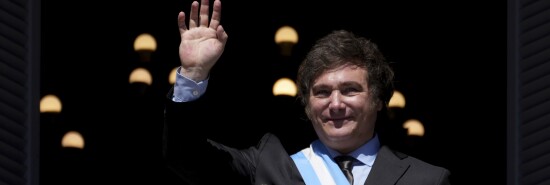
Classical liberalism is on the rise in Argentina
Miles Smith
Video Embed
Javier Milei’s election to Argentina’s presidency seems nothing short of remarkable in a region where elections lurch between elevating nepotistic would-be dictators and outright socialist authorities.
Argentina, in particular, has mainly been governed since World War II by a succession of Peronists, economic populists, and social liberals, the most famous of whom was Juan Peron himself. During the 1970s and early 1980s, decades of Peronist misrule triggered a backlash, which was swiftly put down by a military junta that turned around and lost most of its prestige by losing a disastrous naval war with what most Argentines believed was a morbidly weak post-imperial Great Britain.
FOUR TIMES DEMOCRATS HAVE BACKED SOMETHING THAT MAY COME BACK TO BITE THEM
Although Argentina has largely given up on wars of conquest against its neighbors and European great powers, things haven’t been a swimming success for one of Latin America’s more powerful and economically diverse countries. Crime is rampant, and poverty is high. Buenos Aires dominates the remarkably diverse country.
Enter Milei, who is not so much a right-winger as a libertarian who openly sympathizes with the United States. Economic liberalism and American sympathies have long been verboten in Argentina. Argentine opinion might find Milei radical — he cultivates the image of a man unshackled by political convention and is open about his affinity for former President Donald Trump — but given nearly seven decades of continuous Peronist rule, maybe Milei’s libertarianism and Americanism are exactly what Argentina needs.
Although Peronists have ruled Argentina for the better part of the last 70 years, the economic libertarianism and American-style liberalism Milei proposes is hardly new for the South American republic. When Argentina earned its independence from Spain in 1810, it was little better than a collection of disparate provinces strung along the southern cone of South America. The aptly and somewhat wordily named United Provinces of the Rio de la Plata had independence from imperial Spain but little more.
A rudimentary constitution was promulgated, and 1831 gave the provinces more unity as the Argentine confederation. But the confederation itself remained weak, and its institutions were tied to local warlords. Each province was de facto independent, and cooperation between provincial leaders was rare. In 1835, the governor of Buenos Aires province, Juan Manuel De Rosas, seized power and made himself a de facto dictator over all of Argentina.
Rosas ruled with an iron fist and enforced conservative cultural norms, particularly those celebrated by the Roman Catholic Church, with brutal efficiency. All the while, he allowed the gauchos, mixed-race Spanish and indigenous cowboys in the interior of Argentina who proved to be reliable regime lackeys for Rosas, a reasonably free hand to oversee their ranches and the hinterlands around their farms, or estancias. For 17 years, Rosas ruled without serious opposition. Nonetheless, in Buenos Aires and other Argentine cities, liberals who loathed Rosas’s brutality and hoped for the introduction of American-style constitutionalism waited patiently for their moment.
In 1845, while Rosas was at the height of his power, an Argentine writer named Domingo Faustino Sarmiento published what eventually became perhaps the best-known work written in Latin America during the 19th century. Facundo: Or, Civilization and Barbarism argued that Argentina needed to throw off the reactionary oppression of Rosas and embrace liberal freedoms and constitutionalism a la the U.S. Sarmiento traveled to the U.S. in 1847 and wrote admiringly about the country. He particularly respected President Abraham Lincoln and the Republican Party’s ability to combine nationalism, liberalism, capitalism, and protectionism. Sarmiento eventually became president of Argentina in 1868.
CLICK HERE TO READ MORE FROM THE WASHINGTON EXAMINER
In the 19th century, Argentina found stability and some measure of economic progress by tracking as closely as possible to the U.S. Sarmiento was a man who worked to reconcile the peculiar circumstances of his own country with the virtues of what he saw in the U.S. Progress in economic freedom lay not in protecting the rights of one special class, the gauchos, but in liberating the nascent Argentine economy in the latter half of the 19th century. Political forces in the 20th century have curtailed much of the progress Sarmiento and his fellow classical liberals made in the 1860s and ’70s in Argentina. Twentieth-century Argentina has seemed representative more of statist stagnation than the economic vibrancy of a country as diverse and as rich in resources as Argentina.
Milei’s propositions are innovative and fly in the face of the long-standing sacred cows the Argentine regime keeps. He has already devalued the peso, halved government ministries, and announced a series of spending cuts. He wants to use the American dollar as Argentina’s currency, and he rejects the notion that the government might enforce the sexual revolution’s dogmas in Argentina. That might make him sound like a bit of a cowboy among his countrymen, but Milei’s project is more a restoration of Argentine liberalism than an attempt to impose a so-called right-wing tyranny his terrified political enemies accuse him of wanting.
Miles Smith IV is an assistant professor of history at Hillsdale College.
